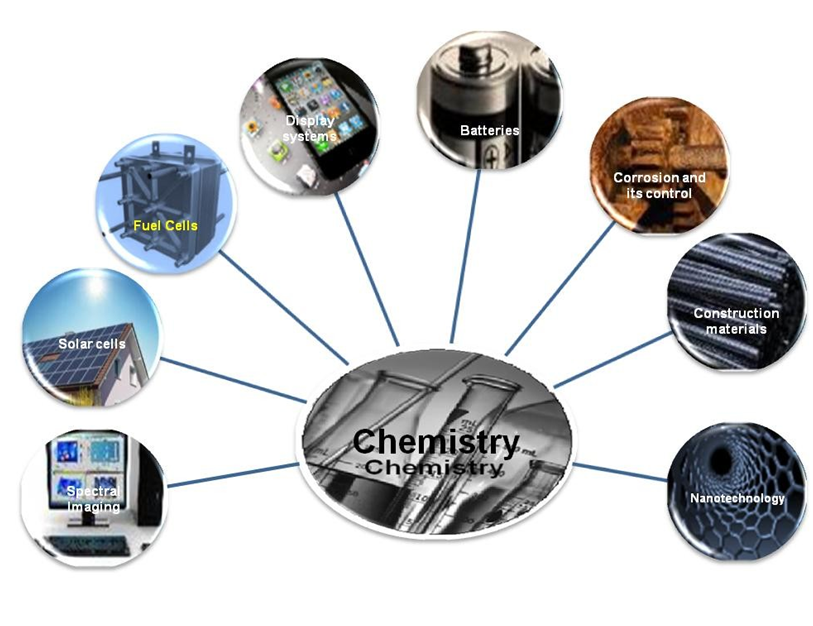
Chemistry is the branch of science that deals with the study of the composition and properties of matter. Thus, chemistry is relevant to every walk of life, and needed in every facet of our daily existence. Without a chemical reaction, there is no single moment in life.
Chemistry, the science dealing with elements, forms the building blocks of everything. Engineering, as applied science, holds little worth if an engineer lacks ample knowledge about these fundamental building blocks.
Engineering Chemistry serves as a bridge between basic sciences and engineering subjects. Engineering courses such as CE, Electrical, ME, CS, and IT require a fundamental understanding of chemistry, whether directly or indirectly. Let’s ponder on a few important aspects of chemistry in various engineering fields.
Computer Engineering & Information Technology
In today’s world, computers have permeated every field, necessitating the development of software by computer engineers. Numerous software applications are employed in the field of chemistry for research and analysis. Software is crucial for interpreting data obtained from research experiments to derive meaningful outputs. Given the vastness of the field of chemistry, there is a future need for developing software packages beneficial in the realm of chemistry. If a software engineer possesses the fundamentals of chemistry, it becomes easier for them to develop software tailored to specific tasks.
Simulation software is being developed for designing new molecules, allowing for the estimation of final results before practical work in chemistry. This reduces the time taken for chemical processes and minimizes chemical waste, subsequently reducing pollution. Developing simulation software requires software professionals with knowledge of chemistry. Therefore, the integration of chemistry in engineering, particularly for CE & IT branches, proves valuable not only in core subjects but also in projects and professional endeavors.
Knowledge of chemistry is essential for the development of supercomputers.


Electronics & Telecommunication and Electrical
Electronics involves the manipulation of electrons, demanding knowledge of chemistry, including elements, properties, and valency electrons. Engineering chemistry aids E&TC and Electrical students in understanding conductors, semiconductors, sensors, and insulators. For the fabrication of electronic devices, knowledge of chemistry is crucial in selecting suitable materials for manipulating electrons.
Electronic chips, pivotal for electronic devices, have materials selected based on their chemistry. Nanotechnology, an emerging field, utilizes chemical synthesis for bulk production of nano-tubes (CNT) used in electronic communication. Chemical vapor deposition, a method using chemical synthesis, is employed in the fabrication of VLSI ICs, where n+ electrons are induced into silicon wafers.
Electronic sensors and bio-sensors, vital for detection and diagnosis, require knowledge of chemistry for fabrication and design. Chemistry plays a crucial role in bio-sensors, where an electronic device receives signals only through chemical reactions.
Ongoing research in conducting polymers, with advantages over traditional silicon-based materials, underscores the necessity for electronics engineers to have fundamental knowledge of chemistry in material selection for device fabrication. Understanding the concepts of chemistry is imperative in studying liquid crystal displays (LCDs), where liquid crystals are organic molecules.
The escalating consumption of electricity prompts the development of photovoltaic cells for conventional electricity generation. Knowledge of chemistry is essential in inventing or discovering efficient materials for the fabrication of solar cells.
Batteries, widely used in various electronic devices globally, are undergoing significant research to enhance efficiency, backup, reduce weight, volume, and cost. Battery materials, including anode, cathode, and electrolyte, require the basics of chemistry for appropriate selection.
In addition to the mentioned points, engineering chemistry plays a significant role in various applications and research areas, benefiting E&Tc and Electrical branches in the present and future.
Mechanical Engineering
The pillars of Mechanical engineering are founded on basic sciences, and the pervasive role of chemistry in this discipline is evident. A mechanical engineer must possess knowledge of material science, encompassing physics and chemistry, covering properties of metals and alloys, alloy composition, stability, reactivity, and other aspects related to chemistry. The operation of any machine or vehicle relies on fuel, and studying the efficiency, quality, and properties of fuel is only possible through the lens of chemistry.
Research to find new, suitable, and efficient fuels necessitates a deep understanding of chemistry. Even after the production of exhausts or residues from engine operation, chemistry is crucial for treating and rendering them harmless to the environment. The selection of a suitable fuel by a mechanical engineer requires consideration of its exhausts, where knowledge of chemistry proves invaluable.
Lubricants, essential for reducing friction between metal surfaces, require a mechanical engineer to possess knowledge of suitable lubricants for specific environments. Understanding the nature and properties of lubricants necessitates knowledge of chemistry.
In many aspects related to chemistry, a mechanical engineer must be well-versed, assisting in their student life, professional endeavors, and research pursuits.


Civil Engineering
Similar to Mechanical engineering, E&TC, and Electrical, Civil engineering also places great importance on chemistry. This significance starts from the manufacture of cement, the production of concrete, and the selection of materials for reinforcement. The chemistry of setting and hardening of cement dictates its stability. Meeting the challenges and requirements of a civil engineer for construction is based on chemical reactions occurring in the incorporated materials.
In the contemporary era, numerous varieties of ceramics and refractories are available. To meet the manufacturing requirements of specific ceramics or refractories for suitable purposes, one must possess knowledge of chemistry.
Selecting a location or area for construction requires a civil engineer to analyze the nature and properties of the soil. Soil analysis, crucial for understanding the interactions between the construction and the surroundings, whether soil or water, necessitates knowledge of chemistry. Water analysis at the construction site also requires an understanding of chemistry.
To comprehend and develop upcoming technologies in civil engineering, knowledge of chemistry proves to be a valuable source of information for civil engineers.
Engineering chemistry is significant not only for the aforementioned branches but also for other engineering disciplines such as Automobile Engineering, Petrochemical Engineering, Agriculture engineering, Food technology, Ocean engineering, etc.

Dr. Nidhi Sharma
Assistant Professor Chemistry
Department of Engineering Sciences
AISSMS’s IOIT, PUNE















